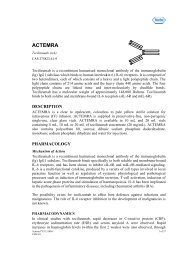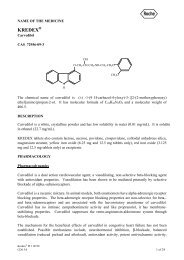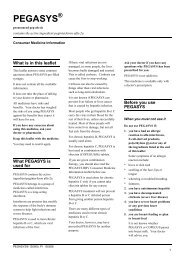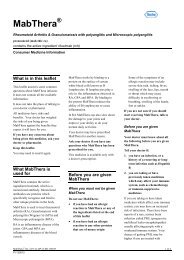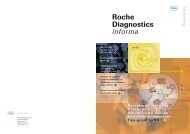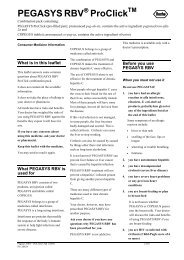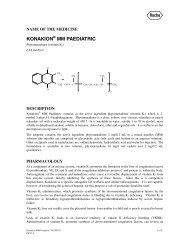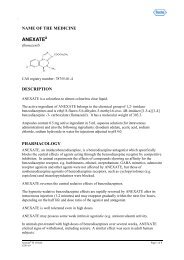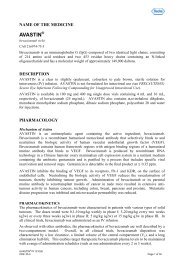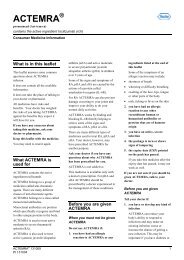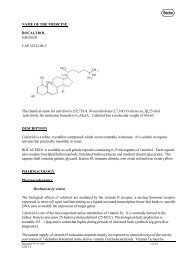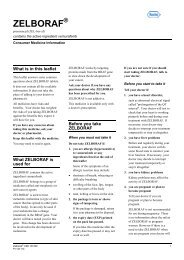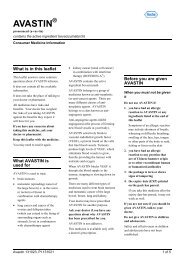Product Information PI - Roche Australia
Product Information PI - Roche Australia
Product Information PI - Roche Australia
You also want an ePaper? Increase the reach of your titles
YUMPU automatically turns print PDFs into web optimized ePapers that Google loves.
Skin and subcutaneous tissue disorders: hypersensitivity reactions such as allergic skin<br />
reactions including dermatitis, rash, eczema and urticaria, erythema multiforme, allergy,<br />
anaphylactic/anaphylactoid reactions, face oedema, Stevens-Johnson-Syndrome and toxic<br />
epidermal necrolysis have been reported.<br />
Hepatobiliary disorders: hepatitis and elevated liver enzymes have been reported in patients<br />
with influenza-like illness receiving oseltamivir.<br />
Psychiatric disorders/Nervous system disorders: convulsion and delirium (including<br />
symptoms such as altered level of consciousness, confusion, abnormal behaviour, delusions,<br />
hallucinations, agitation, anxiety and nightmares) have been reported during TAMIFLU<br />
administration in patients with influenza, predominately in children and adolescents. These<br />
events often had an abrupt onset and rapid resolution. In rare cases, these events resulted in<br />
accidental injury, and some resulted in a fatal outcome, however, the contribution of<br />
TAMIFLU to those events is unknown. Such neuropsychiatric events have also been reported<br />
in patients with influenza who were not taking TAMIFLU. Three separate large<br />
epidemiological studies confirmed that influenza-infected patients receiving TAMIFLU are at<br />
no higher risk of developing neuropsychiatric events in comparison to influenza-infected<br />
patients not receiving antivirals.<br />
Patients with influenza should be closely monitored for signs of abnormal behaviour<br />
throughout the treatment period.<br />
Gastrointestinal disorders: gastrointestinal bleeding was observed after the use of TAMIFLU.<br />
In particular, haemorrhagic colitis was reported and subsided when the course of influenza<br />
abated or treatment with TAMIFLU was interrupted.<br />
Blood and lymphatic system disorders: thrombocytopenia.<br />
DOSAGE AND ADMINISTRATION<br />
TAMIFLU may be taken with or without food (see PHARMACOLOGY). However, taking<br />
with food may enhance tolerability in some patients.<br />
Treatment of Influenza<br />
Treatment should begin within the first or second day of onset of symptoms of influenza.<br />
Adults and Adolescents<br />
The recommended oral dose of TAMIFLU capsules in adults and adolescents ≥ 13 years of<br />
age is 75 mg twice daily, for 5 days. Adults and adolescents 13 years of age and older who<br />
are unable to swallow capsules may receive the appropriate dose of TAMIFLU 6 mg/mL oral<br />
suspension (12.5 mL delivers a 75 mg dose) or home-prepared or pharmacy-compounded<br />
TAMIFLU capsules (see instructions below).<br />
Infants and Children ≥ 1 – < 13 years of age<br />
The recommended weight-adjusted dosing regimens of TAMIFLU for paediatric patients ≥ 1<br />
year old are:<br />
Tamiflu <strong>PI</strong> 6 mg/mL oral suspension and capsules 120119 19 of 28<br />
CDS 10.0



